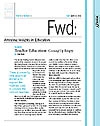Dark Clouds Do Give Way to Sunshine
Ohio’s charter schools are under a cloud. Recent articles in some of Ohio’s major newspapers have challenged charter school efficacy and have provided fodder for opponents who want to regulate these public schools out of existence.

